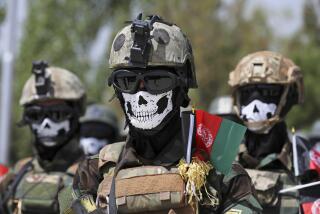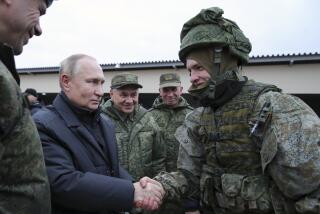Recruits losing heart for the fight
- Share via
PESHAWAR, PAKISTAN — For one paramilitary soldier, the decision to desert came after his horrified parents saw a beheading video and begged him to quit the force.
For another, it was the lack of food and ammunition at the front. For yet another, it was watching wounded comrades languish for days, awaiting medical attention.
Desertion is becoming a serious problem in the ranks of the Frontier Corps, the locally recruited paramilitary force that has been on the front lines of Pakistan’s fight against insurgents in its tribal areas.
Neither the Pakistani military nor the Interior Ministry, which administers the Frontier Corps, would disclose the number of those who have fled the force. But it is thought to be at least 300 in the last three months, out of about 40,000 serving in the tribal areas.
Half a dozen deserters from the Kurram area, which borders eastern Afghanistan, told of morale and equipment problems during their service in North and South Waziristan, where the fighting has been centered.
Thousands of paramilitary troops also have been sent to the embattled district of Swat in northwest Pakistan, but after a series of setbacks, the regular army was sent in to take the lead.
Khandan Gul served three years in the South Waziristan Scouts, a unit of the Frontier Corps. While on a one-month leave, he decided to desert and go to work as a produce vendor in his town’s market.
“I firmly decided I would rather sell vegetables,” he said.
In recent months, militants have seized on the tactic of abducting large numbers of paramilitary troops, who sometimes surrender without a fight. Most are freed, but some suffer a gruesome fate, including a soldier whose decapitated body was recovered Aug. 14.
One soldier, now AWOL, said his family saw video of that beheading and pleaded with him to desert. Another tribesman said the incident prompted his brother to quit the force after 13 years.
For tribesmen, serving in the Frontier Corps was once a point of pride, as well as a livelihood in an area where jobs are scarce. Now, recruitment is so difficult that the corps has dropped its rule that soldiers had to have graduated from the equivalent of high school.
“I don’t want to waste my life for 4,000 rupees,” said one deserter. That’s about $65, the usual monthly salary.
Another said that even under noncombat conditions he and fellow soldiers routinely went two or three days without food, and headed into battle with as few as 60 rounds of ammunition. Harder to bear was seeing the body of a dead comrade go unretrieved for three days.
“Who would serve under such conditions?” he said.
The Bush administration plans to spend millions of dollars equipping and training the Frontier Corps. But for now, one Western military official said, the fighters are woefully unsuited for the tasks they are asked to carry out.
“It’s as if regular police walking a beat were suddenly expected to do what the FBI or a SWAT team could do,” the official said.
The corps is made up mainly of Pashtun tribesmen, the same ethnic group as many of the militants. In addition to feeling ethnic kinship and Muslim solidarity with the militants, many soldiers believe the battle is at the behest of the United States, rather than in their own country’s interest.
“They simply do not want to fight a war that is not perceived as their own,” commentator Sohail Iqbal wrote in the Pakistani weekly magazine Pulse.
Field commanders recognize troops’ reluctance to engage the militants, and standing orders reflect that. Soldiers are told to yell at militants to go away rather than shooting at them.
They also have been instructed not to seize weapons from those passing through checkpoints, and to keep their own weapons stowed while traveling in convoys, deserters said.
“I don’t want to send my son to be slaughtered and the video released for public entertainment,” said the father of one deserter. “He’s better off doing a menial job.”
--
Special correspondent Ali reported from Peshawar and Times staff writer King from Islamabad, Pakistan.
More to Read
Sign up for Essential California
The most important California stories and recommendations in your inbox every morning.
You may occasionally receive promotional content from the Los Angeles Times.










